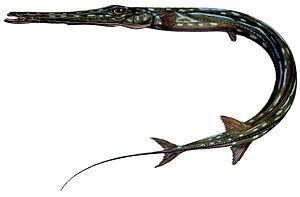Blue-spotted cornetfish facts for kids
Quick facts for kids Blue-spotted cornetfish |
|
|---|---|
 |
|
| Painting by Francis de Laporte de Castelnau, 1856 | |
| Conservation status | |
| Scientific classification | |
| Synonyms | |
|
The cornetfish, also called the blue-spotted cornetfish or tobacco trumpetfish, is a type of fish. Its scientific name is Fistularia tabacaria. You can find this fish in the Atlantic Ocean. It lives along the coasts of the Americas and near West Africa. Cornetfish are not a major fish for commercial fishing.
What Does the Cornetfish Look Like?
Cornetfish can grow quite long. They can reach up to 200 centimeters (about 6.5 feet) in total length. However, most cornetfish are around 120 centimeters (about 4 feet) long.
It's easy to mix up a cornetfish with a needlefish. But there's a simple way to tell them apart! The cornetfish has a smaller mouth and jaws. Its face is also more stretched out compared to the needlefish. Cornetfish are usually greenish-brown on their backs. They have pale blue spots and lines all over their bodies.
Where Do Cornetfish Live and What Do They Eat?
Fistularia tabacaria often lives in areas with seagrass beds. They also like to be around coral reefs. Sometimes, they are found over hard, rocky areas too.
Cornetfish usually swim alone. It is very rare to see them in groups. They mainly eat small crustaceans, which are like tiny crabs or shrimp. They also eat small fish.
Cornetfish are an important food source for other animals. For example, the Atlantic bluefin tuna often eats cornetfish.


